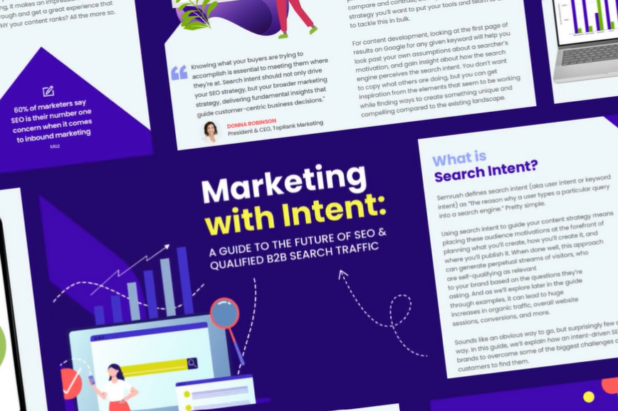Find guidance and resources to elevate your B2B marketing strategy
Developing and maintaining a thoughtfully orchestrated B2B marketing strategy is vital for companies that want to drive sustained growth in a competitive digital marketing landscape.
Read on to find expert guidance and resources for building the best B2B marketing strategy in your industry.
Learn about B2B marketing strategy:
- What is a B2B marketing strategy?
- Why is a B2B marketing strategy important?
- Key pillars of a B2B marketing strategy
- Tactical areas in B2B marketing
- B2B marketing strategy examples
- B2B marketing strategy resources
What is a B2B marketing strategy?
A B2B marketing strategy is a carefully developed plan to promote your brand’s products or services to other businesses. Fundamentally, a marketing strategy serves as a guiding framework to help companies achieve their marketing goals, while accounting for the full spectrum of activities, messaging, and measurement involved.
Learn about marketing strategy services from TopRank Marketing!
Executing a B2B marketing strategy requires a range of tactics and techniques tailored to suit the unique needs and challenges of the B2B environment. A fully fledged B2B marketing strategy serves as a roadmap to connect with potential clients, nurture leads, and drive conversions.
B2B vs. B2C marketing
Unlike business-to-consumer (B2C) marketing, which targets individual consumers and tends to be more broad in its targeting and messaging scope, business-to-business (B2B) marketing strategies are tailored to the unique ways in which businesses buy and sell.
This means your B2B marketing strategy should define and direct factors such as:
- B2B buyer’s journey and marketing funnel
- Frequently lengthy buying cycles
- Professional challenges and pain points of target audience
- Complex buying committee and decision influence dynamics
- Sales and revenue alignment
- Measurement and attribution
Having said that, there is growing sentiment across the B2B marketing industry that business-focused strategies can benefit from incorporating principles of B2C – specifically its emphasis on bold, creative brand building and emotional impact.
- Read more on our blog: 5 Steps For Aligning B2B Brands With Customers’ Changing Needs
69% of B2B marketing leaders agree that B2B purchasing decisions are just as emotionally driven as B2C. (LinkedIn)
Why is a B2B marketing strategy important?
Simply put: With budgets and tactics being evaluated to the degree that they are in most workplaces, modern B2B brands cannot afford to operate without a comprehensive, coordinated, and well-informed marketing strategy. Putting this framework in place helps ensure you can effectively identify target audiences, craft compelling value propositions, and continually improve in all of your efforts.
Without a strategic and measurable approach, B2B brands risk misaligned messaging, missed opportunities, and an inability to stand out in competitive markets, ultimately hindering their growth and success.
Lack of a documented marketing strategy also makes it exceedingly difficult to create a shared vision and aligned approach between the many stakeholders who tend to be involved with marketing operations (i.e. partners, agencies, vendors, and teammates).
Key pillars of a B2B marketing strategy
Research and Analysis
One of the greatest advantages that marketers enjoy in the digital age is an abundance of available data and insight. Given the stakes of marketing success at large and/or growing companies, it’s critical to let quality data and analysis guide your strategy. Routinely conducting keyword research, competitive analysis, content/tech audits, and audience research will help ensure your strategy is informed by evidence instead of assumptions.
Brand Building
Building brand awareness is an essential component of a full-funnel B2B marketing strategy geared for long-term growth. A strong strategy for brand awareness helps ensure your organization is gaining mindshare in your niche or category, setting the stage for market growth and more effective lower-funnel tactics.
- Read more on our blog: The Five Rules for B2B Branding Success: Unlocking the Power of Memory
Demand Generation
Demand generation focuses on developing and accentuating interest in your products and services specifically. Whereas brand awareness content and campaigns are designed to broadly grow recognition and familiarity, demand generation takes the next step in actively stimulating interest, engagement, and interactions with your brand. This primes your lead generation strategy.
Lead Generation
B2B lead generation is the most critical focus of a marketing strategy in the eyes of many marketers and executives. That’s because it’s quantifiable and relatively easy to connect to business impact. Generally, a B2B lead is defined as an individual (or organization) who’s shown concrete interest in your product or service – usually by downloading a gated asset, filling out a contact form, or otherwise.
Businesses that source over 40% of their leads from marketing experience higher conversion rates than others. (Gartner)
While lead generation is an essential pursuit, seasoned B2B marketers recognize that not all leads are created equal, and that B2B lead generation cannot be effective without strong support from other strategic pillars. Identifying and attracting high-quality leads is the golden standard for B2B marketers, and a full-funnel B2B lead generation approach makes it possible.
- Download our resource: The TopRank Marketing Guide to Full Funnel B2B Lead Generation
Organic and Paid
Organic marketing refers to activities and tactics your brand employs to drive digital growth without the use of paid advertising. These include content marketing, organic social, and search engine optimization. Paid marketing refers to paid placements and performance-based campaigns, such as digital advertising, PPC, sponsored content, and paid social.
Striking the right balance of organic and paid in your B2B marketing strategy is paramount. By doing so, your brand is simultaneously laying groundwork for future growth, while also capitalizing on short-term conversion opportunities and driving ROI.
Measurement
A rigorous culture of measurement and analysis is key to an effective B2B marketing strategy. Having access to the tools to measure impact across the funnel, the expertise to analyze and find meaning in your data, and the talent to turn insight into action will help your brand elevate.
Which tactics are addressed in a B2B marketing strategy?
Nesting under your B2B marketing strategy are various channels and strategies that can each play a role in establishing and growing your brand’s online presence.
Content Marketing

Content marketing is the foundation of any successful B2B marketing strategy. It involves creating and sharing valuable, relevant, and consistent content to attract and engage your target audience.
This content can take various forms, keeping pace with the evolving consumption preferences of online audiences. But regardless of the format, you have to be sure your content is informative and well researched. The primary goal of business content is to address the pain points and challenges your potential clients face and, in doing so, establish your brand as an authority and trustworthy partner.
Examples of content marketing tactics
- Blog posts
- Whitepapers, guides, and ebooks
- Case studies
- Infographics
- Podcasts
Learn more about content marketing with TopRank.
Social Media Marketing

Social media platforms are not only for connecting with friends and family – they can also be powerful tools for B2B marketing.
LinkedIn, in particular, is a goldmine for B2B marketers as the leading platform where professionals gather, share insights, and seek business solutions. Building a strong presence on LinkedIn and other relevant social media channels allows you to engage directly with your target audience, share valuable content, and participate in industry discussions.
Examples of social media marketing tactics
- Executive thought leadership
- Strategic relationship-building
- Real-time discussions
- Repurpose content
Learn more about social media marketing with TopRank
Influencer Marketing

Influencer marketing isn’t just for consumer brands. For B2B brands, collaborating with industry influencers and thought leaders can significantly boost your credibility and reach. B2B influencers are experts who have established themselves in their respective niches and have a loyal following.
Partnering with an influencer allows you to tap into their audience and gain access to potential clients who value their advice and recommendations. By strategically aligning your brand with the right influencers, you can amplify your message, build trust faster, and drive conversions.
Examples of influencer marketing tactics
- Influencer interviews
- Co-creating content with influencers
- Influencer-first social content
Learn more about influencer marketing with TopRank.
Digital Advertising

Digital advertising can provide a more immediate bottom-line impact in B2B marketing than organic approaches. Paid advertising campaigns, such as pay-per-click (PPC) and display ads, allow you to deliver targeted and action-oriented messages across different channels.
In addition to providing access to key audiences, platforms like Google Ads and LinkedIn Ads provide valuable data and analytics. These insights are especially valuable for refining your targeting and optimizing your ad spend effectively to ensure maximum ROI.
Examples of digital advertising tactics
- Pay-per-click (PPC) advertising
- Display advertising
- Remarketing campaigns
- Sponsored content
Learn more about influencer marketing with TopRank.
Search Engine Optimization

Search engine optimization (SEO) is the process of aligning your online presence with the expectations of search engines to improve your visibility in search results. Effective SEO involves keyword research, on-page optimization, technical enhancements, and high-quality link building.
By ranking well in search results, you can attract organic traffic from buyers and decision makers actively seeking the products or services you offer. SEO complements other B2B marketing efforts and ensures that your brand is discoverable when potential clients are looking for solutions like yours.
Examples of SEO tactics
- Keyword research
- Keyword glossaries
- On-page optimization
- Technical audits
- Refreshing high-potential content
Learn more about search engine optimization with TopRank.
B2B Marketing Strategy Examples
These are examples of guiding frameworks that are commonly used by B2B organizations to direct their marketing strategies.
Account based marketing (ABM)
This focused approach to prospecting and nurturing involves identifying high-value accounts or companies, and centering marketing efforts toward them. The concentration of resources enables ABM marketers to develop tailored campaigns with strong personalization components.
- Read more from our event coverage: Learn How to Crack The Code on ABM & Intent Data from Seagate and TechTarget – B2BMX
Inbound Marketing
Popularized by Hubspot, inbound marketing serves as a blanket term for marketing activities designed to pull people in (quality, relevant, optimized content) as opposed to pushing out toward them (interruptive advertising). It’s a philosophy that’s taken hold across the B2B marketing industry as brands aim to serve as helpful guides for buyers, earning trust and consideration.
Performance Marketing
Inbound marketing strategies are often blended with performance marketing strategies, which focus more on paying for specific, measurable outcomes. This approach leans heavily on real-time data to inform and optimize campaigns, and is recognized for its straightforward connection to ROI. Performance marketing strategies are often blended with inbound strategies.
Globally, roughly 6 in 10 B2B marketing leaders say their C-suite has increased the importance of brand building. (LinkedIn)
B2B Marketing Strategy Resources
These authoritative sources are all valuable to explore and follow if you want to grow your B2B marketing knowledge and expertise.
- Hubspot: A foremost authority on inbound marketing strategy, with a stunningly expansive array of helpful content covering many topics.
- Marketo: Leading source on ABM that joined forces with Adobe and rebranded its knowledge hub as Marketing Nation.
- Salesforce: One of the most widely adopted customer relationship management (CRM) platforms in the world, and a valuable source of information on business development.
- B2B Marketing: Leadership-focused insights and intel specific to the B2B industry.
More B2B marketing strategy resource from TopRank:
- Optimizing Your B2B Marketing Strategy Around the Trust Funnel
- What’s Missing In Your B2B Marketing Strategy? 5 Key Elements You Don’t Want to Overlook
- Why Your Brand Should Take a Stand with Its Marketing Strategy
Work with the B2B marketing strategy experts: Marketing Strategy with TopRank



